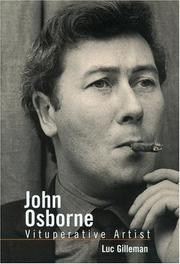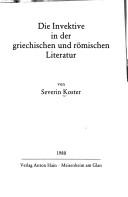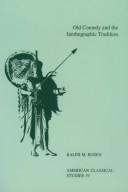| Listing 1 - 10 of 27 | << page >> |
Sort by
|

ISBN: 0815322011 1138884065 1315827085 1317842804 1317842812 9781317842804 9781315827087 9781317842811 9780815322016 Year: 2002 Publisher: New York : Routledge,
Abstract | Keywords | Export | Availability | Bookmark
 Loading...
Loading...Choose an application
- Reference Manager
- EndNote
- RefWorks (Direct export to RefWorks)
For British playwright, John Osborne, there are no brave causes; only people who muddle through life, who hurt, and are often hurt in return. This study deals with Osborne's complete oeuvre and critically examines its form and technique; the function of the gaze; its construction of gender; and the relationship between Osborne's life and work. Gilleman has also traced the evolution of Osborne's reception by turning to critical reviews at the beginning of each chapter.
Osborne, John --- Invective in literature. --- Osborne, John, --- Criticism and interpretation.
Book
ISBN: 9782264055521 Year: 2012 Publisher: Paris : Editions 10/18,
Abstract | Keywords | Export | Availability | Bookmark
 Loading...
Loading...Choose an application
- Reference Manager
- EndNote
- RefWorks (Direct export to RefWorks)
Book
ISBN: 9004660372 Year: 1988 Publisher: Leiden ; New York ; København ; Köln : Brill,
Abstract | Keywords | Export | Availability | Bookmark
 Loading...
Loading...Choose an application
- Reference Manager
- EndNote
- RefWorks (Direct export to RefWorks)
Satire, Arabic --- Arabic poetry --- Invective in literature. --- History and criticism. --- History and criticism.
Book
ISBN: 9782763784458 2763784453 Year: 2007 Publisher: Québec Presses de l'Université Laval
Abstract | Keywords | Export | Availability | Bookmark
 Loading...
Loading...Choose an application
- Reference Manager
- EndNote
- RefWorks (Direct export to RefWorks)
Book
ISBN: 9788832193848 8832193841 Year: 2023 Publisher: Napoli : Paolo Loffredo,
Abstract | Keywords | Export | Availability | Bookmark
 Loading...
Loading...Choose an application
- Reference Manager
- EndNote
- RefWorks (Direct export to RefWorks)

ISBN: 3445118531 9783445118530 Year: 1980 Volume: Heft 99 Publisher: Meisenheim am Glan Hain
Abstract | Keywords | Export | Availability | Bookmark
 Loading...
Loading...Choose an application
- Reference Manager
- EndNote
- RefWorks (Direct export to RefWorks)
Classical literature --- Invective in literature --- Littérature ancienne --- Invectives dans la littérature --- History and criticism --- Histoire et critique --- -Invective in literature --- Literature, Classical --- Literature --- Literature, Ancient --- Greek literature --- Latin literature --- Invective in literature. --- History and criticism. --- Littérature ancienne --- Invectives dans la littérature --- Classical literature - History and criticism

ISBN: 1555403050 9781555403058 1555403042 9781555403041 Year: 1988 Publisher: Atlanta Scholars Press
Abstract | Keywords | Export | Availability | Bookmark
 Loading...
Loading...Choose an application
- Reference Manager
- EndNote
- RefWorks (Direct export to RefWorks)
Greek drama (Comedy) --- -Iambic poetry, Greek --- -Invective in literature --- Greek iambic poetry --- Greek poetry --- History and criticism --- Aristophanes --- Cratinus --- -Criticism and interpretation --- Iambic poetry, Greek --- Invective in literature. --- Poésie iambique grecque --- Komödie --- Jambendichtung --- Rezeption --- Jambus --- History and criticism. --- Histoire et critique. --- Cratinus, --- Aristophanes. --- Criticism and interpretation. --- Geschichte 486 v. Chr.-400 v. Chr. --- Geschichte 500 v. Chr.-400 v. Chr. --- Geschichte 486 v. Chr.-404 v. Chr. --- Griechisch --- Komödie. --- Jambendichtung. --- Rezeption. --- Jambus. --- Griechisch. --- -Kratinos --- Criticism and interpretation --- Invective in literature --- Cratino, --- Kratinos,
Book

ISBN: 235412399X 2914518757 Year: 2020 Publisher: Perpignan : Presses universitaires de Perpignan,
Abstract | Keywords | Export | Availability | Bookmark
 Loading...
Loading...Choose an application
- Reference Manager
- EndNote
- RefWorks (Direct export to RefWorks)
La lettre tue, soit. Mais qu’en est-il de la parole dite vive ? Nous pensons d’habitude à ses vertus communicatives, « à la chaleur que tisse la parole/ autour de son noyau le rêve qu’on appelle nous » (Tristan Tzara). Cependant, lorsque la haine, l’indignation, la colère ou la peine investissent la langue, la chaleur devient vite insoutenable. On appelle « invective » cette fulguration de la langue, ces paroles ou ces discours agressifs visant à réduire l’adversaire, quel qu’il soit, au silence et au néant. Au lieu d’essayer de conceptualiser une notion, il s’agit ici de mettre en évidence des opérations. Ainsi, la première partie (« Présentations ») s’ouvre aux foudres de l’invective (spontanée, codifiée ou littéraire) pour tenter de décrire, et d’expérimenter, deux des processus qui la constituent : un processus irruptif au fil duquel l’affect violent « s’expulse » en passant dans la voix et la langue du furieux ; et un processus ruptif quidélie, sépare et éloigne définitivement les parties en conflit. La deuxième partie (« Littérature et Représentations ») explore plus avant les rapports entre le corps et le verbe, en suivant le cours de l’histoire culturelle occidentale. Quand le corps reprend la parole, non seulement il se met à parler de nouveau, mais aussi il reprend ce qui lui revient, ce qui vient de lui. Reprendre la parole, c’est à la fois l’amender, l’améliorer (comme on reprend des bas) et la blâmer, la réprimander, la condamner. L’invective connaît ainsi une visée proprement poétique.
Literature (General) --- littérature --- sémantique --- invective --- injure --- blasphème --- Invective --- Invective in literature --- Invectives --- Invectives dans la littérature --- Congresses. --- Psychological aspects --- Congresses --- Congrès --- Aspect psychologique
Book
ISBN: 9781409438090 9781409438090 9781409438106 9781315603544 9781317071716 9781138272248 Year: 2012 Publisher: London Routledge
Abstract | Keywords | Export | Availability | Bookmark
 Loading...
Loading...Choose an application
- Reference Manager
- EndNote
- RefWorks (Direct export to RefWorks)
Railing, Reviling, and Invective in English Literary Culture, 1588-1617 is the first book to consider railing plays and pamphlets as participating in a coherent literary movement that dominated much of the English literary landscape during the late Elizabethan/early Jacobean period. Author Prendergast considers how these crisis-ridden texts on religious, gender, and aesthetic controversies were encouraged and supported by the emergence of the professional theater and print pamphlets. She argues that railing texts by Shakespeare, Nashe, Jonson, Jane Anger and others became sites for articulating anxious emotions-including fears about the stability of England after the death of Queen Elizabeth and the increasing factional splits between Protestant groups. But, given that railings about religious and political matters often led to censorship or even death, most railing writers chose to circumvent such possible repercussions by railing against unconventional gender identity, perverse sexual proclivities, and controversial aesthetics. In the process, Prendergast argues, railers shaped an anti-aesthetics that was itself dependent on the very expressions of perverse gender and sexuality that they discursively condemned, an aesthetics that created a conceptual third space in which bitter enemies-male or female, conformist or nonconformist-could bond by engaging in collaborative experiments with dialogical invective. By considering a literary mode of articulation that vehemently counters dominant literary discourse, this book changes the way that we look at late Elizabethan and early Jacobean literature, as it associates works that have been studied in isolation from each other with a larger, coherent literary movement.
Book history --- English literature --- anno 1500-1599 --- anno 1600-1699 --- Invective in literature --- Complaints (Rhetoric) --- Literature and society --- History and criticism --- History
Book
ISBN: 9782343002378 Year: 2013 Publisher: Paris : L'Harmattan,
Abstract | Keywords | Export | Availability | Bookmark
 Loading...
Loading...Choose an application
- Reference Manager
- EndNote
- RefWorks (Direct export to RefWorks)
Histoire littéraire des injures, des insultes et des grossièretés dans le théâtre, la poésie, le roman et la prose latins antiques. Le spécialiste procède d'abord à une étude linguistique et typologique de ce champ lexical transgressif. Il replace ensuite le rôle de l'injure dans les différents genres d'écriture. Il établit enfin une sociologie de l'injure dans la société romaine.
Latin literature --- Invective --- Invective in literature --- Littérature latine --- Invectives --- Invectives dans la littérature --- Themes, motives --- History. --- Thèmes, motifs --- Histoire
| Listing 1 - 10 of 27 | << page >> |
Sort by
|

 Search
Search Feedback
Feedback About
About Help
Help News
News